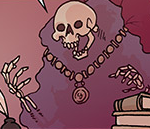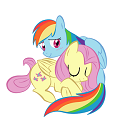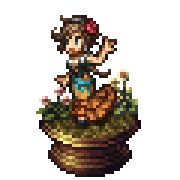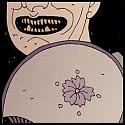|
This is great stuff guys! I like the Temporary Humanoid Operative line a lot, lot of pathos there, and opportunities for additional encounters and hooks. Just a quick flesh out, the THO line was created by this mad genius after examination of a dead Inevitable. They could be created like golems, but had the intelligence to do more subtle or difficult jobs. Didn't stop him from using them on suicide missions, and by design they have a limited life-span. THOM in particular was sent out to eliminate a tyrant hunting down the artificer for his own means. He's a heinous dude on top of that, so he gets eliminated, THOM shuts off, and the empty suit is thrown in a storage room. Only later, by some strange fluke in the design, he wakes up. As far as that player pursues his backstory, he'll find bits of info on the artificer and what kind of work he did. I think for the Epic Battle he'll contribute by discovering an ancient construct siege engine that he can control.
|
|
|
|

|
| # ? May 8, 2024 04:55 |
|
AlphaDog posted:I don't know what that is but it sounds really cool. Link? But of course.
|
|
|
|
M.c.P posted:This is great stuff guys! The siege engine could be a battlemech type thing that he fits into as the "brains". It becomes his "body" while he drives it, but he can't drive it for too long because (gently caress knows, maybe it runs off his his soul or something). Gomi posted:But of course. I'm not a comics fan, but that looks loving awesome.
|
|
|
|
AlphaDog posted:The siege engine could be a battlemech type thing that he fits into as the "brains". It becomes his "body" while he drives it, but he can't drive it for too long because (gently caress knows, maybe it runs off his his soul or something). Even though it has servos, it still requires extreme physical action/movement/energy on his part and continual usage is incredibly tiring. So he gets, say, five rounds plus his CON mod before he passes out.
|
|
|
|
I am having issues integrating more non-combat encounters into my games. I've always been a very "crunchy" DM, focusing most of my time on making interesting combat encounters and customizing monsters, etc. I have never really been very good at the social/investigation/mystery style of play, but I would like to work on that because I don't want my game to just be combat after combat. I just don't really know where to start, I guess I don't know how to lay the groundwork for interesting non-combat interaction. When I sit down to write, I basically say to myself "how long is the session going to be? ok, so how many encounters do I need..." and go from there. The story ends up being a wrapper for the combats, a way to push PCs from one encounter to another. I've only ever really GMd D&D, so maybe that's part of it, but I've tried to put campaigns together for other lighter systems and I end up feeling lost. I feel like if the combat system isn't there then how am I going to fill 4, 8, 12 hours of time? Maybe I'm just not very creative? I don't know. Any tips or advice would be appreciated, seriously I'm a complete novice when it comes to this style of play.
|
|
|
|
gos_jim posted:I am having issues integrating more non-combat encounters into my games. I've always been a very "crunchy" DM, focusing most of my time on making interesting combat encounters and customizing monsters, etc. I have never really been very good at the social/investigation/mystery style of play, but I would like to work on that because I don't want my game to just be combat after combat. Conflict comes down to staking. In a lot of ways, what you're doing works already -- there are reasons your combats are happening, after all. Different people want incompatible things and resort to violence to settle the incompatibility. The only word you need to change in that last sentence is 'violence' to shift from a combat-oriented game to a non-combat one. Change 'violence' to 'escape': You have a chase scene in a busy city, or the long, tense planning and execution of a prison break. Change 'violence' to 'a competition': You have a trial by champion(s) or a contest (foot races, drinking games, and eating competitions all figure in a single Thor & Loki vs. the Giants myth, for instance). Change 'violence' to 'authority': You have a regular trial, or a diplomatic negotiation (anything from a king's court to a gang boss laying down his own law). Figure out what the stakes are, and what the involved parties might use instead of violence to resolve the incompatible desires. That'll guide you a suitable frame.
|
|
|
|
Well take today's session for example. Expected shipments of goods from the north have not been arriving at their town. So they need to go to the next town to the north and see what's going on. I decided the gate is closed and the guy at the entrance is a dick ("official business only", etc.), so they had to negotiate with him to get in. One member ended up pulling out a bag of coins and bribing the guy with like 200 gold, I had already determined he was kind of lovely so of course he takes it and lets them in, so it sort of skipped that whole thing. Which is fine. Then my original thoughts were that they would hit up a bar, roll some streetwise, figure out that there have been raids on caravans while they've been camped at night, and then go traipsing out into the woods trying to lure out the bad guys and then proceed to the "beat them up" stage. What happened is that the PCs decided they wanted to go to the city council (which didn't even exist before the session), and see if they can get a reward or something for helping out the town. They ended up having to go to town hall and meet up with some low level custodian bureaucrat who gave them the run-around, put in a request to meet with the council that probably wouldn't even be processed for a week, and ended up going to the town guard and some local shopkeepers to gather more info and get some type of reward figured out. And that was fine, but it was completely unexpected, so I feel like it didn't go as smoothly as I'd like. And I would like to be able to incorporate more of that type of stuff into my campaigns but I don't know how to plan for it, or if you even can. I know I don't have the work ethic to write up a ton of NPCs for some random town that the PCs will most likely never interact with in any meaningful fashion. Like the town they're "based" in right now, there are a handful of notable NPCs but their interactions pretty much amount to "quest-giver" even though I tried to give them some personality, etc. So I was completely sidelined when the PCs wanted to go down this path I hadn't even considered. And I can never plan for how long something like that's going to take because I don't know what the PCs will latch onto or ignore. We don't play OFTEN but we generally have longer sessions, so I like to try to keep stuff sort of tidy and have an "episode" that mostly wraps itself up by the end of the night. Sometimes I feel like I should just pick up Savage Worlds or something, a lighter type of system, and just run that for a while and maybe that would help me with some of the improv, off-the-cuff social/investigative type stuff. sighnoceros fucked around with this message at 06:05 on Aug 7, 2011 |
|
|
|
gos_jim posted:And I would like to be able to incorporate more of that type of stuff into my campaigns but I don't know how to plan for it, or if you even can. I know I don't have the work ethic to write up a ton of NPCs for some random town that the PCs will most likely never interact with in any meaningful fashion.
|
|
|
|
One really good piece of advice I've seen is that regardless of who the NPC is, give them something they are thinking about as the PCs interact with them. It can be how the game on TV is turning out, how much they want to get in the pants of the person in the cube next door, etc. That tiny bit of conflict helps a lot.
|
|
|
|
Unless I have a great idea for an NPC I pretty much go by the seat of my pants and go with what feels right at the time. Some of my most notable ones was a grizzled old farmer turned levied veteran turned beggar after his side lost. Even if his side won he'd still be a farmer. But he shot his mouth off to a soldier and they broke his kneecaps. A natural twenty later for a heal check I thought "Well, I shouldn't let this go to waste." And after they lifted him to a bar (he crapped on their back, he couldn't walk, wet slopping noise. Less funny, more sad and embarrassing for him. They laughed at first until I described how awful he felt for being in this position) and fed him and patched him up he became their official go to guy for word on the street. We even renamed our streetwise checks and called them Petewise checks, as characters kept rolling twenties with this guy for some reason and getting crazy awesome rolls on their checks. Weeks later, the guys were in trouble and I was just rolling awesome and they were rolling badly, so I thought to myself, "What the hell, they earned it," and Pete speared a heavily armored knight and stuck a knife through his helmet after about three turns of fighting, which turned the tide. He was still old and underfed and out of breath after all of this, but his legs weren't as busted up and he had fighting spirit again. All of this happened because the first guy they talked to while they were in town I just happened to name Pete, he was a beggar and they adopted him. I just made it up on the fly, keeping it simple and writing it down later. So don't be afraid to just make poo poo up on the fly. It really lends to a more organic experience to the game then "My name is generic fantasy name 3, may I eat a thousand razor blades my story is so horrible, boo hoo." I used to fall into this habit of making up convoluted horrible stories for people. But players can empathize more with "They took my farm, my dignity and my legs away from me. gently caress those guys" because it is easier to understand.
|
|
|
|
Just thought of this. How does everyone here feel about killing main NPC's in games with no or limited resurrection? Not just in a main fight or at an appropriately dramatic time, but I mean because they're unlucky or in the wrong place or just in some way which cheapens their life and leaves whatever destiny they supposedly had unfulfilled? I've been killing main NPC's so much that people aren't getting as attached as they were before. Characters have to sometimes work to keep the NPC's that they drag along with them alive and in the short term it is often easier and safer just to abandon them instead of going to the wall for them. But I'm wondering if I'm going too far with, "Life is cheap, here's your grit, enjoy your noir" sometimes. Thoughts?
|
|
|
|
Even with resurrection I tend to keep NPCs around. Its useful on multiple levels, since they can meet the same named character again, and have a better sense of continuity(plus I suck at names so its win-win), they have actual people they can go to for particular businesses and killing things loses its impact if they never got to know them.
|
|
|
|
Yawgmoth posted:Don't stat out NPCs like that, you will likely never need to know how strong Steve the County Clerk is or whatever. nWoD is a really good model for this I think: just make a short paragraph, maybe two if necessary. Just give a description of personality, current motivations/goals, maybe a vice or hobby or something that the players might hook onto or discover, and then a couple things that NPC is good at that they might need to roll. Really you can make thousands of filler NPCs just by making a few archetypes and then altering one or more things about the above writeup to suit the occasion/area. To take it a step further, when your PCs ask for an interaction with a NPC you haven't thought of, if you plan on keeping him around, give each PC a chance to say a single sentence about him. Add your own, and ta-da, a fully fleshed out NPC, with the additional benefit that your players care a little bit about him, because they made him. Slightly different example, but... One time this worked really well for me was when the PCs were camping out in the wilderness. I had them tell a "ghost story" round robin style, with me starting with an opening detail about a monster of some kind. Everyone game the monster some attributes. I ended the story with a heavy handed "Of course, this is only a legend, no one ACTUALLY believes in the X". From then on, the players were on the lookout for it, and when they finally encountered it, it was a very satisfying encounter.
|
|
|
|
Really super-duper important question here: I need a good name for an organization (homebrew but stereotypical fantasy setting). The organization is basically the The Minutemen from 100 Bullets (see 2nd paragraph of Plot section), but instead of illuminati-like families of power, they keep order among the gods themselves. Basically a small group of very powerful, near-god-level mortals who keep the gods from moving in on each other's territory. They're neutral, but not exactly benevolent, and are willing to commit impressive acts of violence to maintain this uneasy truce. We already have an organization named after hands/fists. Something that can be left as a enigmatic symbol or mark is a plus. I'm not much good at coming up with awesome names like this. How do people usually come up with names for this sort of thing? I'm bad enough with NPC names.
|
|
|
|
incogneato posted:Really super-duper important question here: The Tall Poppy (because the tall poppy is cut down, see): leaves little iron poppy pods as a token. I personally like making the token something not very intimidating on its own that becomes scary because of what it represents, but your group may prefer something more inherently intimidating. The Carpenter (because the nail that sticks up gets hammered down): Leaves little nails carved out of stone as a token. Both of those seem to fit the group's mission as punishers of exceptional deities and being ruthless levelers.
|
|
|
|
The BCO: Bureau of Celestial Oversight. they leave a stack of paperwork you can fill out if you feel they've made a mistake.
|
|
|
|
Ice Phisherman posted:Just thought of this. How does everyone here feel about killing main NPC's in games with no or limited resurrection? Not just in a main fight or at an appropriately dramatic time, but I mean because they're unlucky or in the wrong place or just in some way which cheapens their life and leaves whatever destiny they supposedly had unfulfilled? If I ever feel like my NPC cast is too much, or if I feel the characters are getting too cozy with the setting, I do precisely this. It really depends on the setting you are going for- if you are going for something fun and light-hearted, do not do this. Consistency is great when it comes to engaging players, and when they want to help NPCs succeed in their goals it can provide for great sessions ahead. I feel like it's an accomplishment in itself to get players attached to your characters. I've recently run a game of WFRP with some old friends, and I'm going to be running a game of ASIFRP soon. I feel like in these kind of games, where the players themselves are mortal as gently caress, it's appropriate to do that to NPCs. Perhaps there's a character that's out to avenge the death of his father or something- Kill his rear end off. Be sure to pay attention to who the PCs like and who they dislike. I always kill off someone they like offscreen at some point in the campaign before they even catch a glimpse of their goals. I'd like to say that it creates a dramatic effect or provides an amazing storytelling experience, but the most i've ever gotten out of my players is "Man, what a bummer." So be sure to take my advice with a grain of salt- I'm still experimenting with the concept myself. Arrrthritis fucked around with this message at 06:42 on Aug 11, 2011 |
|
|
|
The players favourite NPC was just killed in the game I run. It wasn't heroic at all, killed by falling rocks and debris while he slept, but I don't give special protection to NPC's and almost none to the players. His loss as an ally and the cause of his death will really shake things up after a year of them not leaving the same location. They also might be sad because they set in motion the incident that killed him. So many plots and hooks in a single death. I'm going to miss the guy too, but rolls are rolls.
|
|
|
|
Baronjutter posted:The players favourite NPC was just killed in the game I run. It wasn't heroic at all, killed by falling rocks and debris while he slept, but I don't give special protection to NPC's and almost none to the players. His loss as an ally and the cause of his death will really shake things up after a year of them not leaving the same location. They also might be sad because they set in motion the incident that killed him. So many plots and hooks in a single death. I'm going to miss the guy too, but rolls are rolls. I'm not sure that's the most productive attitude. If the NPC needs to die for the story that's fine, but at random? Really? I mean, if you want to remove the dude to motivate the PCs, and killing him in a "random event" style suits you or the game or the players, sure, but "roll dice, rocks fall, ally dies, now what?" doesn't sound like much fun to me. Unless you're playing Hackmaster or something where that would be perfectly in the spirit of the game. Different styles I guess. I suppose I'd be fine if the NPC ally died in combat due to poor rolls, so I'm probably being a hypocrite.
|
|
|
|
The entire local world is being simulated all the times with tons of things going on behind the scenes and it's all complex enough that even I know don't know what's going to happen all the time. There's tons of factions, organizations, countries, and powerful NPC's with their own agendas trying to accomplish things. Their fav npc just happened to be at a location where another faction created this event that killed him, and it was the players that got the ball rolling for that event to happen so it does link back to their actions. Our game is very non-traditional. It's quite open-world, with a world simply being simulated and them interacting with, affecting, and reacting to it. There's also absolutely no concept of balance or fairness, things are what they are. It makes for a very different game as the players have no sense of the safety that comes from a DM magically creating perfectly fair challenges for them. It also comes with a far greater sense of accomplishment as they truly earn everything through skill and planning, rather than god plotting their lives out in a series of custom designed challenges perfected suited for their abilities.
|
|
|
|
I'm not sure if I understand the distinction you're making here: who is "simulating" all these things if not you, the godlike GM?
|
|
|
|
Doc Hawkins posted:I'm not sure if I understand the distinction you're making here: who is "simulating" all these things if not you, the godlike GM? Holy poo poo, I actually agree with you. Baron, it's not like there's a third-party computer that's managing the details of the simulation such that you, the GM, only have to tweak or nudge things occasionally. Every single occurrence in the world is entirely instantiated by you and your mind. Even if the players are providing input and creating the story collaboratively, you're still the one who dictates how events play out. If there's a rock fall, you're the one who decides on the severity and who gets affected. Even if you're using random rolls or percentile dice to figure these things out, you're still making judgment calls as to what aspects of the situation are determined by a random element, and what the potential outcomes of that roll could be. Also, what are these possibly "unfair" encounters that they're running into? Do you have them planned out ahead of time? If so, what's the point of pitching encounters over the heads of your players? And if that's not what you're doing, then aren't you still tailoring your encounters to your players?
|
|
|
|
Baronjutter posted:The entire local world is being simulated all the times with tons of things going on behind the scenes and it's all complex enough that even I know don't know what's going to happen all the time. There's tons of factions, organizations, countries, and powerful NPC's with their own agendas trying to accomplish things. Their fav npc just happened to be at a location where another faction created this event that killed him, and it was the players that got the ball rolling for that event to happen so it does link back to their actions. You're not smart enough to simulate anything with a degree of accuracy. For reference: we have a real world here with real observable events and economists and social scientists still have trouble determining what is going to happen, even with their thousands upon thousands of man-years of work attempting to use a computer or mathematics to simulate the world. Add a dragon or owlbear or some other creature that has never existed and never will and trying to guess it's effects to the simulation and it would diverge even more from what would "really" happen. So at this point you're not simulating anything, you're making up random poo poo. So knock this stupid poo poo off and stop thinking you're smart enough to model all these forces and just make a narrative that is the most satisfying for the players (or allow them to forge their own). To me you just sound like a smug rear end in a top hat and a terrible DM. Megaman's Jockstrap fucked around with this message at 16:53 on Aug 11, 2011 |
|
|
|
incogneato posted:Really super-duper important question here: Knights of the Scale As they maintain balance. They can mark their kills either by drawing a scale at the scene, leaving a small brass scale by the body, or if you're feeling theatrical, leaving a gold coin in the victim's right hand and a lead disc in the left. Their hands represent the sides of the scale, gold and lead being life and death, and the gold acting as blood money for the victim's family because hey- they're just keeping the cosmic balance here. Concilators or Arbiters The former if they see themselves as benevolent peacekeepers, the latter if they see themselves as the punishers of those who step out of line. Their symbol is an unbroken circle representing the harmony of the status quo. They can either paint it around the victim's body or brand it into their flesh with an iron. As for how I usually name things, my campaign might not be a perfect example. It's based on the endless political and philisophical struggles of powerful churches, so groups tend to employ the imagery of their respective gods. But in general, I say take something that's an important tenet of the group, find a good symbol thereof, and then apply it in a way which either represents their dedication to that cause, or strikes fear into their enemies. For instance, in my campaign one of the less pleasant Gods is The Starved Man, the god of want and denial. His two primary orders are The Famished and Locusts. The former are the churches most dedicated knights, who are sealed inside blessed armor and left to starve to death. When they die, their spirits possess the armor and serve for eternity (But there's still a withered corpse knocking around inside). The latter punish those villages which cheat the church by failing to offer the requisite portion of their harvest in sacrifice. They burn silos, poison stock, and salt fields to teach blasphemers the value of denial.
|
|
|
|
Holy poo poo dudes, I just run a handful of countries and factions as if they were npc's with set goals. Every month or so I make some rolls to see how well their plans are coming along and often get results that I couldn't predict as I stick to these rolls no matter what it means to the plot. There isn't really a plot, it's just a world the players set their own goals in (but it's full of hooks for adventures of course) I probably am a bad GM though, I think most traditional rpg players expecting a D&D style experience would be bored to tears in my game. Whole sessions can be about designing and building a mill for the village, or fussing about legal matters, or spending days travelling to a cave to check it out and say "gently caress no" and come back. Luckily I have a nice group of players who apparently enjoy this style of game play. Where the hell is this hostility coming from?? Baronjutter fucked around with this message at 17:42 on Aug 11, 2011 |
|
|
|
Baronjutter posted:Where the hell is this hostility coming from?? If I sounded hostile, it wasn't intentional. Your post did sound a little holier-than-thou, though, which in retrospect I can probably chalk up to the fact that most people in this forum, myself included, write more formally than they need to and that often comes across as condescending. Mostly it was this line: "Our game is very non-traditional. It's quite open-world, with a world simply being simulated and them interacting with, affecting, and reacting to it" and this line: "It makes for a very different game as the players have no sense of the safety that comes from a DM magically creating perfectly fair challenges for them. It also comes with a far greater sense of accomplishment as they truly earn everything through skill and planning, rather than god plotting their lives out in a series of custom designed challenges perfected suited for their abilities" that made it seem like you were talking down and indirectly criticizing other styles of play. More than that, though, you just touched on a few things in that post that pretty much open a can of worms every time they get mentioned here. Sorry for jumping down your throat!
|
|
|
|
Baronjutter, I think the basic issue is that you used language that lovely GMs sometimes use to justify lovely games, despite appearing to be a perfectly reasonable GM, at least for your group. Some GMs try to justify boring stories and bullshit challenges on the basis that the PCs are in an accurate model of a world, and that what happened is "what would really happen." This is obviously lunacy. It seems like you're trying to create the impression of a living, breathing world, an aesthetic choice, and I don't think anyone is going to have a problem with that. It also seems like you use randomness to try to keep things fresh, to keep yourself from falling into patterns, which is common enough in a game. What people get mad about are GMs who try to pretend that rolling on a particular table or to creating a world with a particular unbeatable threat wasn't a specific, creative decision that they made and are responsible for. A table which provides randomized inspiration for personality traits is great. A table where there's a 1/1,000 chance of the campaign ending abruptly because a secret plan the PCs never knew about destroys the Earth without them having any ability to address it is stupid, even if it isn't necessarily "unrealistic."
|
|
|
|
Megaman's Jockstrap posted:To me you just sound like a smug rear end in a top hat and a terrible DM. You mad bro? I dunno you kind of sound like a smug rear end in a top hat and a terrible DM, saying "YOUR PLAYERS". So how about this: Baro runs one of the best campaigns I've taken part in. The world can be brutal but things aren't arbitrary. There is no immersion-breaking DM magic going on (and if there is his players certainly don't know what the gently caress) and, the most important part, I care about things in the game. I care that I made a mill (what an exciting role-playing experience  ) I care about the villagers, about Rizman, about what the new life is and why the church runs it's insane Crusades-like campaign against magic and blames everything on necromancy, what that odd stone-spire lab-like building was. I care about the characters, the world, and I wonder (when I'm off in real life) what the outcomes of situations are, or what characters are REALLY up to. Like a really good TV show. ) I care about the villagers, about Rizman, about what the new life is and why the church runs it's insane Crusades-like campaign against magic and blames everything on necromancy, what that odd stone-spire lab-like building was. I care about the characters, the world, and I wonder (when I'm off in real life) what the outcomes of situations are, or what characters are REALLY up to. Like a really good TV show. Imagine 4 DMs at the edge of an improv stage. DMing is the same way. Point is, a typical DM's job is to simply hide the rails and get the players back on them without the players noticing, to shuffle them off to the next pre-planned encounter that you spent days perfectly balancing and have to re-do if a single player is away. Or, you can be much more relaxed and actually role-play situations that happen to come up, accidents, changes in the lineup. This is our style. Sorry if our dynamic world system is too advanced for you, but with you playing 4th ed I'm sure anything beyond WoW's amazing realism would be too much. I doubt you could appreciate the groundbreaking systems we've developed. KakerMix fucked around with this message at 18:24 on Aug 11, 2011 |
|
|
|
Baronjutter posted:Holy poo poo dudes, I just run a handful of countries and factions as if they were npc's with set goals. Every month or so I make some rolls to see how well their plans are coming along and often get results that I couldn't predict as I stick to these rolls no matter what it means to the plot. There isn't really a plot, it's just a world the players set their own goals in (but it's full of hooks for adventures of course) Sounds cool. You could just decide what happens instead of using rolls, though. The point of these countries doing stuff is to create an interesting context for play, so why not make up that context directly ("I want a dangerous, pitched fight someplace dark and flammable!") then make up the causes for it ("A raiding party from Country A was cornered in a barn, and the city guard are going to solve that by burning it down, but the players care because...uhhh...oh! Because that squire NPC was in the market when it happened and is one of the hostages, and he could die!") Speaking of which, I honestly think endangering NPCs the players care about is good GMing, which is why I try to do it all the time, not when the dice say so. Suddenly killing them outright reinforces certain moods and themes that don't fit with every game, but it's still cool, in my opinion.
|
|
|
|
Astfgl posted:More than that, though, you just touched on a few things in that post that pretty much open a can of worms every time they get mentioned here. Sorry for jumping down your throat! This is it exactly. I saw the post last night, started typing out angry words, and caught myself, said gently caress it and went to bed. I do think there's a marked difference between random rolls for broad forces currently outside of the players control, and a "welp dice say rocks killed your favorite npc while you were sleeping. thems the breaks."
|
|
|
|
KakerMix posted:Sorry if our dynamic world system is too advanced for you, but with you playing 4th ed I'm sure anything beyond WoW's amazing realism would be too much. I doubt you could appreciate the groundbreaking systems we've developed. e: like, this whole post explaining why you like the way you guys play and what makes it cool in a way that should at least enable everyone to appreciate it, even if they like other styles better, only to reveal it was really just "the game you play is dumb and for kids" wankery all along? Really? My Lovely Horse fucked around with this message at 18:35 on Aug 11, 2011 |
|
|
|
KakerMix posted:Sorry if our dynamic world system is too advanced for you, but with you playing 4th ed I'm sure anything beyond WoW's amazing realism would be too much. I doubt you could appreciate the groundbreaking systems we've developed.
|
|
|
|
Doc Hawkins posted:
This is exactly it. A terrible DM is a terrible DM because they are bad at it, not because of what system they are using. I've played very good pre-planned campaigns on rails, and I've played some good open-world type games. It just so happens that, right now, the open-world style game that Baro is running right now is very good, which leads me to believe that he knows how to DM using the open-world style game where things aren't so rigid just because the DM said so. On the flip side too, it's nice to play by the dice rolls as a DM. Simply stating things to make a good story (at least for me) is a very creatively taxing without some sort of chance. The dice throwing a wrench in the system can make for some very exciting role playing.
|
|
|
|
Doc Hawkins posted:Sounds cool. You could just decide what happens instead of using rolls, though. The point of these countries doing stuff is to create an interesting context for play, so why not make up that context directly ("I want a dangerous, pitched fight someplace dark and flammable!") then make up the causes for it ("A raiding party from Country A was cornered in a barn, and the city guard are going to solve that by burning it down, but the players care because...uhhh...oh! Because that squire NPC was in the market when it happened and is one of the hostages, and he could die!") I think having it be random keeps the DM having fun and on his toes too rather than just the players, but yeah it really is just personal preference. I have played with awful DMs of Baron's style, and amazing ones. Same with railed DM's, it's very much up to the DM how well they can manage it. EDIT: efb;
|
|
|
|
KakerMix posted:Point is, a typical DM's job is to simply hide the rails and get the players back on them without the players noticing, to shuffle them off to the next pre-planned encounter that you spent days perfectly balancing and have to re-do if a single player is away. Or, you can be much more relaxed and actually role-play situations that happen to come up, accidents, changes in the lineup. This is our style. Both DMs are hiding the rails, they're just doing it in different ways. Both can be "actual" role-playing of situations, either style can be more relaxed than the other (slavish devotion to a random table and an already-built world is hardly "relaxed"), and neither one is necessarily more realistic than the other. Your last sentence makes me think you're just trolling, but since Baronjutter has been a decent poster, I figured I'd give you the benefit of the doubt.
|
|
|
|
fosborb posted:I do think there's a marked difference between random rolls for broad forces currently outside of the players control, and a "welp dice say rocks killed your favorite npc while you were sleeping. thems the breaks." This is what I was talking about. That's terrible DMing. Kakermix posted:Sorry if our dynamic world system is too advanced for you, but with you playing 4th ed I'm sure anything beyond WoW's amazing realism would be too much. I doubt you could appreciate the groundbreaking systems we've developed. Oh good! The players are terrible too. You all deserve each other.
|
|
|
|
Baronjutter posted:Holy poo poo dudes, I just run a handful of countries and factions as if they were npc's with set goals. Every month or so I make some rolls to see how well their plans are coming along and often get results that I couldn't predict as I stick to these rolls no matter what it means to the plot. There isn't really a plot, it's just a world the players set their own goals in (but it's full of hooks for adventures of course) When you're rolling dice in an RPG it's because you either want or accept that something will happen that you can't predict. As a PC you predict that you'll be able to affect the world. The idea of, say, "sorry guys, I know you spent all last session reinforcing the town, but the bandits rolled a natural 20" gets a lot of danders up.
|
|
|
|
I just want to keep the game setting honest, so players can trust that their actions matter and won't be obviously or subtly undone because the DM wants a different plot. As a player nothing makes me loose interest in a game more than knowing that no matter what I do, the DM keep things on his or her set track. At the core that's what it's about, creating a world the players can trust in to be fair. Obviously a majority of the stuff is just purely DMed, but I try to be as fair, realistic, and impartial as possible and use a couple spread sheets and general rule systems to help keep my self honest. My background as a GM came not from running D&D games as a teen, but from coming up with strategy games. Simple table-top versions of civ using lego blocks and monopoly money. Forum based strategy games. Play by email space empire building. I love coming up highly abstracted systems that model economics and politics while being simple enough to be used in without requiring a computer to process. This current game I'm running is pretty much one of my simple abstracted strategy games but with an rpg inside. As the players move around, explore and interact with things I have to generate more details than the strategy layer provides, but there's always that strategy layer running fairly in the background helping generate the rpg layer, and actions on the rpg layer of course can have huge effects at the strategy level. I don't track every NPC, but I do track general numbers. A region might have 40 bandits in it, the players encounter some bandits, which are quickly fleshed out as simple npc opponents, and once killed, the region now has 10 less bandits, which might bump that region down from a "Extreme" level of bandit danger to "high", which might mean a village within that region is finally able to make a good roll to free them selves from the yoke of the bandits. Years later the players may visit the region and find a previously oppressed town now free and prosperous because of the player's help. This sort of thing is the focus of the game. Why don't I just make all that up instead of having stats and systems? The same reason characters like having stats and rules for anything, to feel they are playing a game with an uncertain outcome based on their actions and skills, not just having a pre-written story read to them. I think some people are getting the impression I'm running a totally traditional D&D-like game, but just sometimes rolling on some event table and saying "well, I rolled 57 on this chart, looks like a dragon is attacking your town". It's more like "This group of 50 bandits are trying to force your village into paying tribute. They have a stupid leader but he rolled quite well for his general leadership/planning check and I'm going to interpret his good planning roll on him realizing he isn't strong enough to attack the town, instead he's going to spend the year trying to buddy up with a couple of his smaller local rival bandit groups that have 15 and 30 members respectively. If his negotiations are successful, he'll try to attack next year with nearly 100 guys". Then next year I'll roll for the bandit leader's negotiations, maybe he'll be successful and the players will be in huge trouble. Maybe he'll fail so badly it leads to combat between the bandit clans to the players befit. Baronjutter fucked around with this message at 19:22 on Aug 11, 2011 |
|
|
|
Sir Kodiak posted:Both DMs are hiding the rails, they're just doing it in different ways. Both can be "actual" role-playing of situations, either style can be more relaxed than the other (slavish devotion to a random table and an already-built world is hardly "relaxed"), and neither one is necessarily more realistic than the other. My last line was a dig directly at Jockstrap because he apparently gets really upset that people play games in different styles and feels the need to insult because of that. He was a dick, I was a dick. I meant 'relaxed' in implementation. Sometimes the world sucks and it seems (I am just a player after all) that there are realistic reasons for why things happen. Say, the time I almost died because I took two crossbow bolts to the chest. It might have been a random chance or a dice roll or whatever, but as a character it's because I was a little too brazen and simply rushed in (they were the first crossbows we'd encountered. How was I supposed to know?) I've played both extreme styles and like you said, they are both hiding the rails. It's just how good you are at hiding them that really makes it work (and avoiding ego-tripping DMs) and I'd even go to the extreme and say that hiding the system from the game is the best hallmark of a good DM. I don't want to see or hear '10 points of damage!' I wand to see 'You slashed him with the tip of your sword into his belly, he doubles over and is coughing'
|
|
|
|

|
| # ? May 8, 2024 04:55 |
|
Yeah and a lot of that is cool and I wish my DM would get to loving work designing all that poo poo, but a problem can arise because the players can only affect the game on the RPG layer, not the strategy layer. So (and not that I'm saying this is bound to happen) it's certainly possible that despite all their roleplaying they might have everything swept under a tide of natural 20s and natural 1s. That's "realistic", for some level of realism, but its kind of a lovely way to roleplay.
|
|
|












 GOONS ARE MEAN
GOONS ARE MEAN 




























